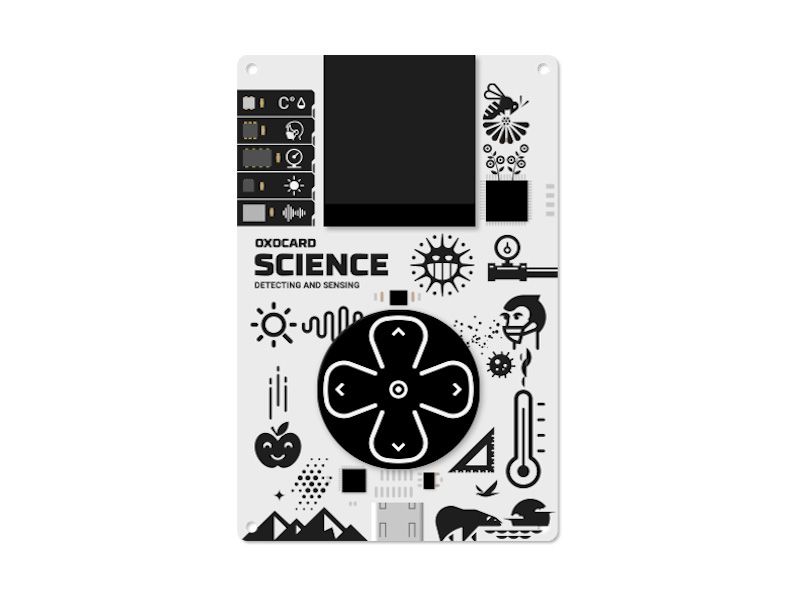
Oxocard Science Card by Oxocard
This programmable multi-sensor board measures light/IR, temperature, noise, humidity, pressure and volatile compounds (VoC, eCO2 and ethanol). It comes with ready-to-use programs with documented source code, so you can start your own experiments right away.
The seven built-in environmental sensors provide twelve sensor values that you can experiment with. Use the built-in programs, modify them or write your own code.
We only perceive a small part of the environment with our senses. Impressive examples show you more about how to make the invisible visible. The card comes with over ten examples and small games - all with full source code and tutorials - that you can experiment with right away, even without programming.
Be amazed by impressive animations that show you how to simulate life. Bounce balls that move when you move the map.
On the board, which is only the size of a credit card, you’ll find a high-resolution screen, five buttons, seven sensors and a powerful computer chip that you can program directly via a browser.
The Oxocard is programmed with the scripting language Oxoscript. This was optimized especially for small computers and is particularly suitable for beginners, since it contains many powerful commands from sensor technology, computer graphics and animation.
Thanks to ready-made programs, you can get started right away even without programming experience. We’ll show you how to create amazing effects with simple adjustments.
With the pedagogical concept «Use-Modify-Create» starten wir mit fixfertigen Programmen, we start with ready-to-use programs that are adapted by means of instructions. This leads to faster results and increases the motivation to learn.
Purchase
Contribute
Have some info to add for this board? Edit the source for this page here.
CircuitPython 9.2.8
This is the latest stable release of CircuitPython that will work with the Oxocard Science Card. Use this release if you are new to CircuitPython.
Modules included in this download
_asyncio _bleio _eve _pixelmap adafruit_bus_device adafruit_pixelbuf aesio alarm analogbufio analogio array atexit audiobusio audiocore audioio audiomixer audiomp3 binascii bitbangio bitmapfilter bitmaptools board builtins builtins.pow3 busdisplay busio busio.SPI busio.UART canio codeop collections countio digitalio displayio dualbank epaperdisplay errno espidf espnow espulp fontio fourwire framebufferio frequencyio getpass gifio hashlib i2cdisplaybus io ipaddress jpegio json keypad keypad.KeyMatrix keypad.Keys keypad.ShiftRegisterKeys keypad_demux keypad_demux.DemuxKeyMatrix locale math max3421e mdns memorymap microcontroller msgpack neopixel_write nvm onewireio os os.getenv paralleldisplaybus ps2io pulseio pwmio rainbowio random re rotaryio rtc sdcardio select sharpdisplay socketpool socketpool.socketpool.AF_INET6 ssl storage struct supervisor synthio sys terminalio tilepalettemapper time touchio traceback ulab usb vectorio warnings watchdog wifi zlibFeatures: Wi-Fi, USB-C, Bluetooth/BTLE, Display, Speaker
CircuitPython 10.0.0-beta.0
This is the latest development release of CircuitPython that will work with the Oxocard Science Card.
Alpha development releases are early releases. They are unfinished, are likely to have bugs, and the features they provide may change. Beta releases may have some bugs and unfinished features, but should be suitable for many uses. A Release Candidate (rc) release is considered done and will become the next stable release, assuming no further issues are found.
Please try alpha, beta, and rc releases if you are able. Your testing is invaluable: it helps us uncover and find issues quickly.
Release Notes for 10.0.0-beta.0
Modules included in this download
_asyncio _bleio _bleio (native) _eve _pixelmap adafruit_bus_device adafruit_pixelbuf aesio alarm analogbufio analogio array atexit audiobusio audiocore audiomixer audiomp3 binascii bitbangio bitmapfilter bitmaptools board builtins builtins.pow3 busdisplay busio busio.SPI busio.UART canio codeop collections countio digitalio displayio epaperdisplay errno espcamera espidf espnow espulp fontio fourwire framebufferio frequencyio getpass gifio hashlib i2cdisplaybus io ipaddress jpegio json keypad keypad.KeyMatrix keypad.Keys keypad.ShiftRegisterKeys keypad_demux keypad_demux.DemuxKeyMatrix locale lvfontio math max3421e mdns memorymap microcontroller msgpack neopixel_write nvm onewireio os os.getenv paralleldisplaybus ps2io pulseio pwmio qrio rainbowio random re rotaryio rtc sdcardio select sharpdisplay socketpool socketpool.socketpool.AF_INET6 ssl storage struct supervisor synthio sys terminalio tilepalettemapper time touchio traceback ulab usb vectorio warnings watchdog wifi zlibFeatures: Wi-Fi, USB-C, Bluetooth/BTLE, Display, Speaker
Absolute Newest
Every time we commit new code to CircuitPython we automatically build binaries for each board and language. The binaries are stored on Amazon S3, organized by board, and then by language. These releases are even newer than the development release listed above. Try them if you want the absolute latest and are feeling daring or want to see if a problem has been fixed.
Previous Versions of CircuitPython
All previous releases of CircuitPython are available for download from Amazon S3 through the button below. For very old releases, look in the OLD/ folder for each board. Release notes for each release are available at GitHub button below.
Older releases are useful for testing if you something appears to be broken in a newer release but used to work, or if you have older code that depends on features only available in an older release. Otherwise we recommend using the latest stable release.
